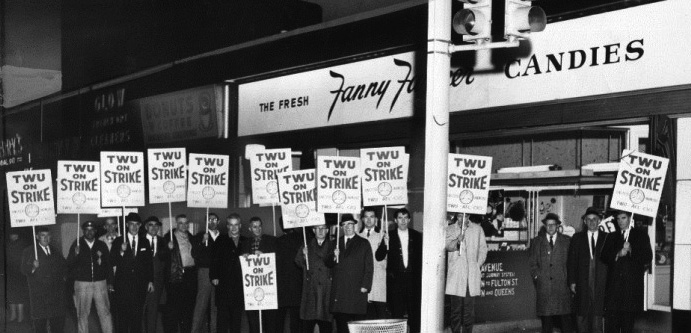Published 05 Jan, 2016
1966 Strike a Seminal Moment in TWU History
Fifty years ago this month, New York City transit workers, led by TWU founding president Michael Quill, voted unanimously to strike, setting the stage for how TWU is recognized today: a fighting, militant union that stands up for justice for all working people, with the courage to advocate for what is right, even if it isn’t popular.
Ten minutes after 1965 became 1966, Quill and his team stormed out of a bargaining session with the Transit Authority and brought the city to a screeching halt. It was a move that put TWU on the map nationwide as a union that will aggressively defend its members.

Local 100 members on strike brought New York City to its knees. TWU Local 100 archive photo
TWU rank and file members—33,000 strong—walked off their jobs, shutting down subways, buses and even private bus lines. Six million commuters had nothing to ride. It is estimated the strike cost the city nearly $100 million a day in lost business.
But more importantly, the transit strike set ablaze a true movement in every sense of the word: TWU galvanized people around an idea and the late 1960s saw momentous strikes to improve workers’ lives across other industries. TWU changed the model. We changed the way business was done.
In the end, the strike resulted in the overhaul of laws governing public sector workers, granting them the right to organize and bargain collectively; the right to invoke arbitration in contract disputes; and the right to “status quo” on wages and benefits. TWU’s leadership won huge concessions that dramatically improved hours, conditions, and pay; more importantly, they leveled the playing field for all public employees. It was a watershed moment for the labor movement, and TWU was at the center of all.
Our history is important, because it guides us today in an even more complex world, where unfortunately, we face many of the same obstacles our brothers and sisters were facing half a century ago.
TWU’s members are the boots on the ground that keep not only this union afloat, but the entire heart of the American economy beating. And that’s why we fight for you today and in 1966, when the city that doesn’t sleep became the city that couldn’t move. TWU: United Invincible.
Watch President Lombardo’s speech to Local 100 on the significance of the 1966 strike.
